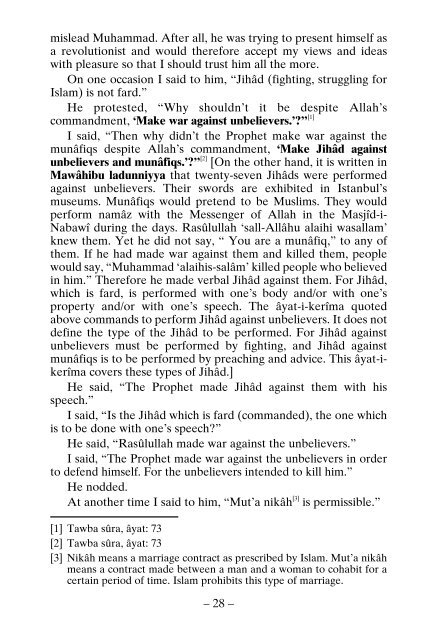Confessions Of A British Spy
Muhammad of Najd was the sort I had been looking for. For his scorn for the time’s scholars, his slighting even the (earliest) four Khalîfas, his having an independent view in understanding the Qur’ân and the Sunna were his most vulnerable points to hunt and obtain him. So different this conceited youngster was from that Ahmed Efendi who had taught me in Istanbul! That scholar, like his predecessors, was reminiscent of a mountain. No power would be able to move him. Whenever he mentioned the name of Abû Hanîfa, he would stand up, go and make an ablution. Whenever he meant to hold the book of Hadîth named he would, again, make an ablution. The Sunnîs trust this book very much. Muhammed of Najd, on the other hand, disdained Abû Hanîfa very much. He would say, “I know better than Abû Hanîfa did. In addition, according to him, half of the book of wrong.
Muhammad of Najd was the sort I had been looking for. For
his scorn for the time’s scholars, his slighting even the (earliest)
four Khalîfas, his having an independent view in understanding
the Qur’ân and the Sunna were his most vulnerable points to hunt
and obtain him. So different this conceited youngster was from
that Ahmed Efendi who had taught me in Istanbul! That scholar,
like his predecessors, was reminiscent of a mountain. No power
would be able to move him. Whenever he mentioned the name of
Abû Hanîfa, he would stand up, go and make an ablution.
Whenever he meant to hold the book of Hadîth named he would, again, make an ablution. The Sunnîs trust this book
very much.
Muhammed of Najd, on the other hand, disdained Abû Hanîfa
very much. He would say, “I know better than Abû Hanîfa did.
In addition, according to him, half of the book of wrong.
Create successful ePaper yourself
Turn your PDF publications into a flip-book with our unique Google optimized e-Paper software.
mislead Muhammad. After all, he was trying to present himself as<br />
a revolutionist and would therefore accept my views and ideas<br />
with pleasure so that I should trust him all the more.<br />
On one occasion I said to him, “Jihâd (fighting, struggling for<br />
Islam) is not fard.”<br />
He protested, “Why shouldn’t it be despite Allah’s<br />
commandment, ‘Make war against unbelievers.’?” [1]<br />
I said, “Then why didn’t the Prophet make war against the<br />
munâfiqs despite Allah’s commandment, ‘Make Jihâd against<br />
unbelievers and munâfiqs.’?” [2] [On the other hand, it is written in<br />
Mawâhibu ladunniyya that twenty-seven Jihâds were performed<br />
against unbelievers. Their swords are exhibited in Istanbul’s<br />
museums. Munâfiqs would pretend to be Muslims. They would<br />
perform namâz with the Messenger of Allah in the Masjîd-i-<br />
Nabawî during the days. Rasûlullah ‘sall-Allâhu alaihi wasallam’<br />
knew them. Yet he did not say, “ You are a munâfiq,” to any of<br />
them. If he had made war against them and killed them, people<br />
would say, “Muhammad ‘alaihis-salâm’ killed people who believed<br />
in him.” Therefore he made verbal Jihâd against them. For Jihâd,<br />
which is fard, is performed with one’s body and/or with one’s<br />
property and/or with one’s speech. The âyat-i-kerîma quoted<br />
above commands to perform Jihâd against unbelievers. It does not<br />
define the type of the Jihâd to be performed. For Jihâd against<br />
unbelievers must be performed by fighting, and Jihâd against<br />
munâfiqs is to be performed by preaching and advice. This âyat-ikerîma<br />
covers these types of Jihâd.]<br />
He said, “The Prophet made Jihâd against them with his<br />
speech.”<br />
I said, “Is the Jihâd which is fard (commanded), the one which<br />
is to be done with one’s speech?”<br />
He said, “Rasûlullah made war against the unbelievers.”<br />
I said, “The Prophet made war against the unbelievers in order<br />
to defend himself. For the unbelievers intended to kill him.”<br />
He nodded.<br />
At another time I said to him, “Mut’a nikâh [3] is permissible.”<br />
[1] Tawba sûra, âyat: 73<br />
[2] Tawba sûra, âyat: 73<br />
[3] Nikâh means a marriage contract as prescribed by Islam. Mut’a nikâh<br />
means a contract made between a man and a woman to cohabit for a<br />
certain period of time. Islam prohibits this type of marriage.<br />
– 28 –


